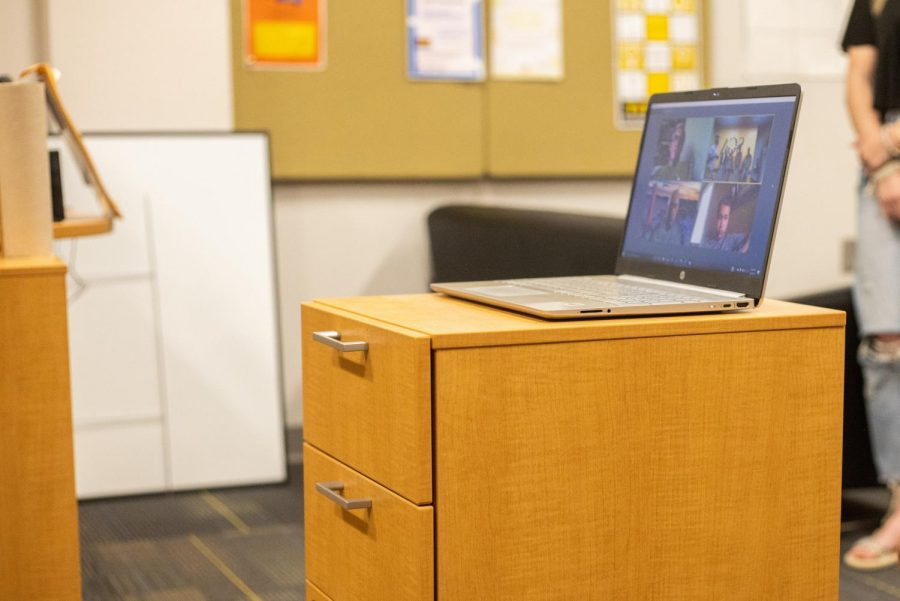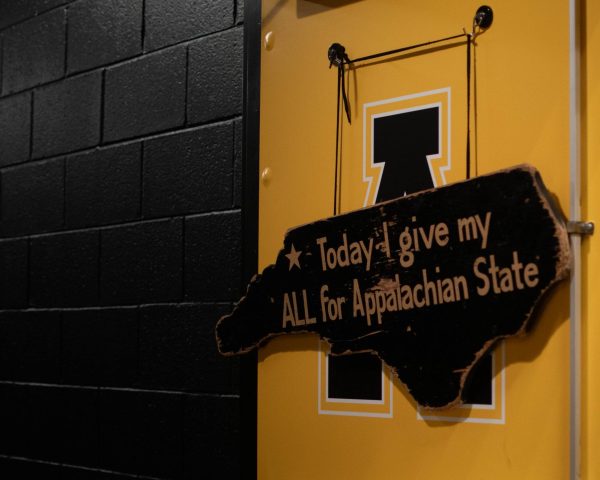SGA elections seat 20 senators, pass two referendums amid low turnout
The 2021 student body president and vice president elections featured hybrid events, like the election results, which are usually reviewed in person, partially reviewed over Zoom with JJ Brown, vice chancellor of Student Affairs, Jeff Cathey, director of the Department of Student Engagement and Leadership and Devin Mullins, SGA election court chair joining virtually.
April 5, 2021
Voters passed two referendums and elected 20 senators to the App State Student Government Association Monday.
The race, which also elected the next student body president and vice president, had 1,421 votes in its largest-voted race and 242 in its smallest.
In one referendum, 69.24% of voters said yes to making the director of diversity and inclusion and the diversity and inclusion committee permanent and constitutionally-protected parts of the App State SGA.
In the other, 72.27% of voters said they supported a $2 student fees increase to go toward the Renewable Energy Initiative. The REI initiative is a “student-led, student-funded organization that seeks to install renewable energy and energy efficient projects on campus,” according to the ballot.
Bailey Shannon earned 93.02% of the 983 total votes for special interests and service initiatives senator. Shannon, a junior environmental science major, is currently a special interests and service initiatives senator.
Nadine Jallal earned 97.95% of the 244 total votes for the multicultural affairs senator. Jallal, a sophomore English, secondary education major, is currently a multicultural affairs senator.
Evan Martino, Benjamin Negin, Mary Blake Harris and Gabe Montalbano earned seats as sophomore class senators with 26.25%, 24.88%, 24.88% and 23.97% of the 242 votes for sophomore senators. Negin, Harris and Montalbano currently serve as freshman class senators. Montalbano is also the senate parliamentarian.
Madison Harris, Trey Blackwood, Madison Neisz, Riley Cullen, Melanie Jordan, Zannah Kukral and Brayden Benkiel-Robinson will serve as junior class senators next year. Harris earned 18.24% of the vote, Blackwood earned 18.04%, Neisz earned 14.92%, Cullen earned 14.73%, Jordan earned 12.97%, Kukral earned 10.63% and Benkiel-Robinson earned 10.43% of the 378 total votes for these seats. All of these winners currently serve on SGA – all as sophomore senators, except Cullen, who is a junior class senator. Blackwood is also chair of the student senate committee on rules. Cullen is also the chair of the student senate committee on external affairs.
For senior class senators, Chloe Vaughn, Benjamin Gonzalez Jr., Connor Schlaline and Cameron Helms earned seats with 27.85%, 25.72%, 24.88% and 21.53% of the 801 total votes, respectively. All of these students currently serve on SGA: Vaughn and Helms as junior class senators, Gonzalez Jr. as a senior class senator and Schlaline as chair of the senate committee on rules.
Lillian Hlavin and Connor Ranes respectively earned 55.21% and 44.78% of the votes to serve as honors and academics senators. Ranes, a sophomore psychology major, currently serves as an honors and academics senator. Hlavin is a sophomore political science major.
Samuel Gass, a junior sustainable development major, earned 93.63% of the total 219 votes to serve as the College of Fine and Applied Arts senator. Gass is currently a College of Fine and Applied Arts senator and chair of the student senate committee on sustainable development.
This year’s election had a low turnout of 1,421 voters compared with last year’s all-time high, which SGA Director of Elections Ardeshir Pirzadeh says exceeded 2,500 total votes. He said the senate elections this year were “less than satisfactory.”
Pirzadeh says he will recommend that the next director of elections hold elections for senate seats in the fall – this year’s election filled just 20 of 80 total seats.
SGA hosted elections this past fall too, but that isn’t typical, Pirzadeh said. Plus, in the fall, 160 people declared candidacy for those 80 seats.
“We’re going to have to do a good bit of work for the remainder of the school year,” he said.
Pirzadeh says that this year, while students are going through so much due to COVID-19, is when student representation should become even more important.
“Given everything, I understand. But, at the same time, we really should be pushing for more interest and advocacy this year than ever before,” he said.

















